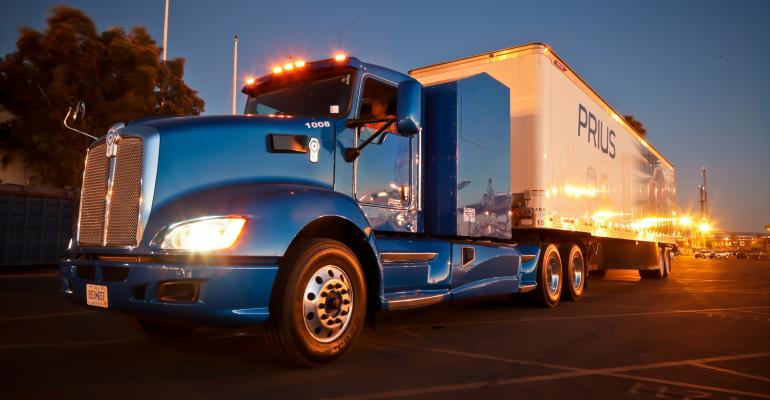LOS ANGELES – To further the pace of hydrogen fuel-cell adoption, proponent Toyota is building what it bills as the world’s first megawatt-scale carbonate fuel-cell power-generation plant with a hydrogen fueling station.
The plant, named Tri-Gen and set to be operational by 2020 at the Port of Long Beach near Los Angeles, will use agricultural waste from dairy farms in Northern California to generate about 2.35 megawatts of electricity and 1.2 tons of hydrogen per day.
The daily electricity output could power 2,350 “average-sized” homes, Toyota says, while the 1.2 tons of hydrogen could propel 1,500 vehicles.
The 100% renewable tag Toyota is applying to the plant comes from its use of the agricultural waste as a feedstock. The waste will journey to the plant via a pipeline network, Doug Murtha, group vice president-strategic planning for Toyota Motor North America, tells media today at the 2017 Los Angeles auto show.
No combustion occurs in the processing, he says, adding, “Gas is fed into a fuel cell and the fuel cell then converts basically a methane bio-gas into electricity, hydrogen and water – and heat’s another byproduct.”
The plant was developed by FuelCell Energy. While that company’s focus has been on carbon capture, Murtha believes Tri-Gen’s bio-gas application with direct hydrogen refueling makes the facility the first of its kind in the world.
Toyota is not announcing how much money it is putting into Tri-Gen, but does say the plant received support from the U.S. Department of Energy, the California Air Resources Board, the Orange County Sanitation District and South Coast Air Quality Management District, as well as the University of California-Irvine. UC-Irvine’s research helped develop the core technology, Toyota says, adding Tri-Gen will exceed strict California air-quality standards.
The hydrogen made at the site will fuel Toyota’s Mirai fuel-cell sedans, on sale in California and arriving at Long Beach from an assembly plant in Japan, as well as fuel the automaker’s Project Portal Class 8 proof-of-concept truck. Air Liquide, already a partner of Toyota for hydrogen refueling stations in the northeastern U.S., will help the automaker create at the port what it says will be one of the world’s largest hydrogen refueling stations.
Murtha notes 4,000 successful test miles (6,440 km) have been logged on the big rig that is fitted with two electric motors making 670 hp, two fuel-cell stacks from the Mirai, some of its hydrogen tanks and a 12 kWh lithium-ion battery pack.
Despite Murtha’s declaration the demo truck is performing “way beyond” Toyota’s expectations, he says it’s possible nothing may come of the project, and makes clear Toyota’s intent is not to be a commercial-truck maker.
“The potential here would be (to become) a powertrain-system provider,” Murtha says. “To be honest, we’re still so early in this we’re not sure it’s even going to pan out. But it’s clearly something of interest, and that’s really what we’re studying at this point.”
He lauds Tesla’s efforts at a battery-electric semi, believing it shows there needs to be powertrain changes in the heavy-duty transportation sector.
“If we sell a Mirai it takes a (gasoline-engine-powered) Corolla off the road. That’s great. It’s a positive for emissions,” he says. “But if we can come up with a zero-emission-vehicle solution to take a diesel tractor off the road, that has a much greater societal benefit, so we’re not surprised there are folks working on battery-electric solutions to this. We’re obviously placing our bets in the fuel-cell space and we’re happy others are looking at (changing the paradigm).”
Morry Markowitz, president-Fuel Cell and Hydrogen Energy Assn., tells WardsAuto the plant fulfills the promise of hydrogen as a scalable energy source that can transform the transportation sector.
He sees no competition between fuel-cell proponents and battery-electric-vehicle backers such as Tesla’s Elon Musk.
“We actually believe strongly that the future of the automobile industry is going to be a (combination) of vehicles,” Markowitz says, noting the internal-combustion engine will be alive and well in the future, as will hybrids and plug-in hybrids. BEVs and FCVs will have more limited roles but will be present as well.
“For 100 years, we’ve been dealing with two different types of fuels in the transportation sector. We’ve had gasoline and diesel,” he says. “(The situation isn’t) winner-take-all. I think the consumer will decide for their individual needs – whether it’s retail or even business – what vehicle will meet their demands.”
Murtha says Toyota and Air Liquide are in the process of setting up their 12 hydrogen refueling stations in the Northeast and have “learned our lessons about how different it is going about doing that in the individual states back there vs. California.”
Per local media in Providence, RI, a Toyota/Air Liquide station was operational there in early October.





